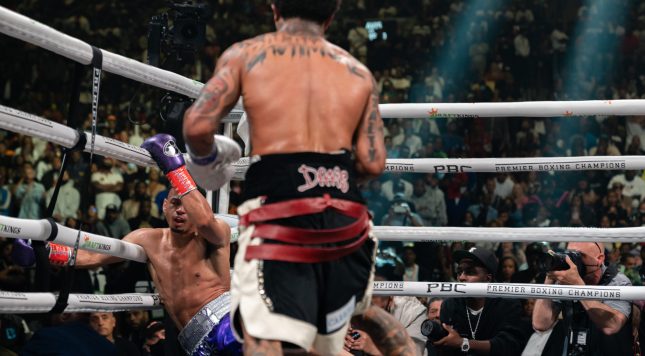Let us consider the matter of Gervonta Davis’ career, as it sits at a particular kind of crossroad: The kind where he can continue to tread water in relative safety, or takes the foundations of superstardom and builds upon them.
They key word in the above sentence is “relative,” because Rolando Romero is not, as he demonstrated Saturday night on Showtime Pay-Per-View even in a loss to Davis, a safe opponent for much of anybody. Yes, his career didn’t have much to go on through 14 fights, but his power appeared real — Davis fought him like it was, anyway — and he proved himself, for the most part, fearless.
For Davis? With all his talent? Relatively safe. Certainly Romero was so relative to his last opponent, Isaac Cruz, whom Davis fought with an injured hand and got pushed to the brink of his first loss en route to a close decision victory.
We’re about to talk about that aforementioned crossroad, but let’s first discuss how Davis defused Romero.
He began the 1st cautiously, connecting on most of the only really notable punches of the round outside of a late Romero right — first a left, then a 1-2 that he mixed up and down. Davis switched direction adeptly, and tied up when Romero got close.
In the 2nd, he began mixing in just, um, “standing still,” which normally isn’t how you handle a power puncher, but it seemed to confuse Romero, until later in the round he trapped Davis along the ropes twice with some flurries. A counter right over the top from Davis might have persuaded some fighters to disdain such an attack, but it didn’t Romero; that lack of trepidation probably cost him his consciousness by the 6th.
The 3rd saw some firefights as Davis realized he needed to convince Romero that his confidence was unfounded, but it only slowed Romero a touch, who was back to his late-2nd round aggressiveness by the 4th. Davis responded by trying to back Romero up in return. Romero was undeterred, forcing Davis to tie up some more and Romero to respond with some frustrated roughhousing in the 5th.
The 6th brought a resounding end as Davis, once more with his back against the ropes, used Romero’s lunging momentum to try to shove his face through the back of his skull with a well-timed counter left from down low. Romero rose, yet was in no shape to continue.
We still know after this fight that Davis has a ton of talent, both physical ability and defensive and offensive technique. What we don’t know is what happens for him next.
Romero was rude in his assessment of Davis’ career pre-fight, noting certain (mostly accurate) weaknesses in his resume. The best win on Davis’ ledger is Leo Santa Cruz, for instance, who had no business fighting at a weight class that high. In this regard, Davis’ arc has certain similarities with that of Errol Spence, Jr., whose best opponent was an undersized Mikey Garcia. Both, too, are generating strong live audiences.
Spence is older, though, and has tacked on a couple other quite-good wins, against the likes of Shawn Porter and his last opponent, Yordenis Ugas. Both still need to step up their level of competition.
What Davis has going for him that Spence doesn’t is, his promotional free agency that he can use to get the kinds of fights Canelo Alvarez has used to get any fight HE wants. Davis said he’s planning to leave Floyd Mayweather, Jr. as his promoter. Mayweather has booked for Davis the kind of fights he booked for himself in the later phases of his career: Dangerous enough to sell to the public, but ultimately quite winnable and not immensely threatening.
Color us skeptical that Davis leaves Mayweather, or that he steps up his matchmaking while independent and making plenty of money taking on lesser challenges. The likes of Josh Taylor, the 140-pound king, or the winner of lightweight champ George Kambosos, Jr. vs. Devin Haney, or even a Teofimo Lopez or Vasiliy Lomanchenko, would make for appetizing battles. If our skepticism is misplaced… “This is where the fun begins.”
(Rolando Romero, left, hits the canvas against Gervonta Davis, left; credit: Ryan Hafey/Premier Boxing Champions)

